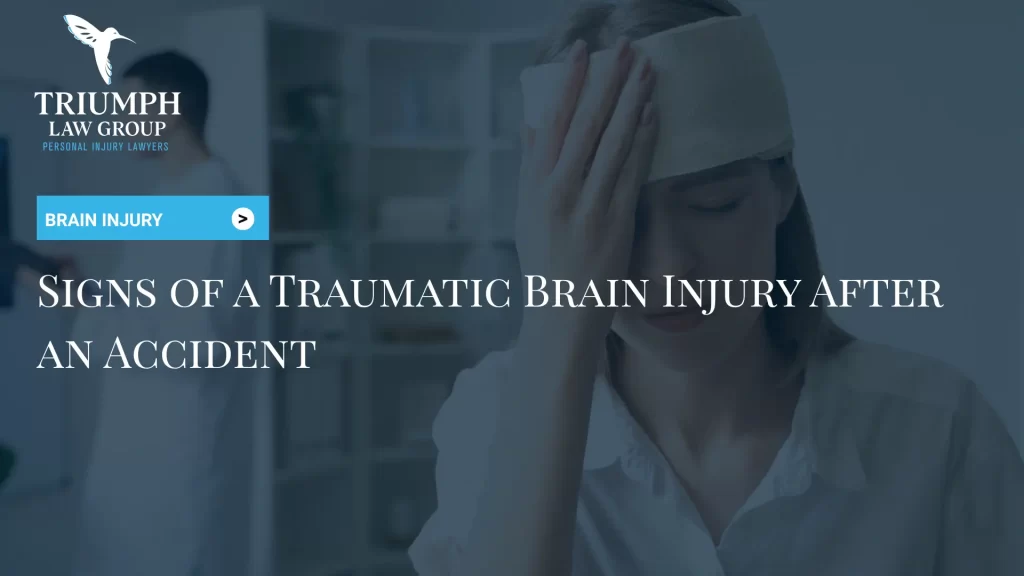
Some injuries show up right away. Others stay hidden until something feels off. A traumatic brain injury (TBI) often falls into that second category. You may not realize anything happened until hours or even days after a crash or an accident in which you hit your head, which is why recognizing the early signs of TBI after a car accident is so important.
That doesn’t make it any less severe. Untreated brain injuries can change the course of your health, your work, and your daily life. That’s why it matters to know what to watch for—and to understand what common hazard symptoms of traumatic brain injury are so you can act quickly if something doesn’t feel right.
Phoenix brain injury lawyers meet people all the time who miss the signs of a head injury until the symptoms take over. When you recognize a TBI early, you protect your health, your case, and your future.
Common Signs of TBI After an Accident
You may not lose consciousness during an accident. Even so, you could still suffer a traumatic brain injury. TBIs don’t always follow a predictable path, and post-concussion symptoms can vary widely depending on the part of the brain tissue affected.
Some symptoms will hit you right away. Others build over time and leave you wondering if something isn’t right. Watch for changes in how you think, move, or feel. Even small shifts—foggy thinking, shaky balance, or sudden mood swings—can point to something more serious than expected.
Here are some of the most common signs:
- Headaches that worsen over time or feel different from any you’ve had before
- Confusion or memory loss, especially if you forget conversations or events
- Mood swings, irritability, or unusual emotional reactions
- Dizziness, blurred vision, or sensitivity to light and sound
- Speech difficulties, such as slurred words or trouble forming thoughts
- Loss of consciousness, even for a few seconds
- Nausea or vomiting, especially when paired with headaches or fatigue
In more severe cases, you might also experience seizures, pupil changes, or clear fluid leaking from the nose or ears. These symptoms call for emergency medical care.
Post-traumatic headaches, personality changes, and cognitive impairment might not show up until well after the vehicle accident. That delay often leads people to dismiss the symptoms or blame them on stress, but they could be warning signs of something more serious.
Please read more about liability accident here: Can Multiple Parties Be Liable in a Truck Accident Case?
Legal Importance of Recognizing TBI Symptoms
A traumatic brain injury affects your health, your daily life, and your legal options. When you report symptoms early, you create a stronger starting point and help connect the accident to what you experience.
Why Early Symptom Recognition Matters
Brain injuries can change how you think, how you feel, and how you function. That makes it hard to explain what you’re going through to an insurance company—especially when those symptoms don’t appear immediately.
When you recognize the signs of TBI after an accident and evidence, your legal team gains something solid to work with. If you report symptoms early, your lawyer can more easily link the injury to the incident. That connection may make a difference if you pursue personal injury compensation.
How Insurance Companies Push Back
Insurance companies often push back on these claims. They may say the injury didn’t happen during the accident or that your symptoms don’t sound severe enough. They may point to a routine CT scan and argue there’s nothing wrong.
But you don’t need a dramatic scan to prove a brain injury. You need clear documentation, consistent reporting, and support from the right doctors. The law allows you to seek compensation for the physical, mental, and emotional impact of a TBI—but you’ll need to build that case from the very start.
What Strengthens a TBI Claim
Medical records, symptom journals, and statements from people who saw the accident or noticed changes in your behavior can help show what happened. These details will create a timeline that connects your injury to the accident.
Your lawyer will collect that information, review it carefully, and build a case reflecting your experience—not just what appears on a scan or police report. Every detail matters when trying to show a brain injury’s full impact.
What to Do If You Suspect a TBI
Even if you feel okay right after the accident, take brain injuries seriously. Some damage doesn’t show up until swelling or internal bleeding starts. The sooner you act, the better your chance of getting the right treatment and protecting your legal rights.
Here’s what you can do:
- See a doctor as soon as possible, even if you didn’t hit your head directly. Let them know you were in an accident and talk through every symptom, no matter how small it seems.
- Follow up with a specialist if anything gets worse or doesn’t go away. A neurologist can run tests that your regular doctor might not.
- Write down everything you notice, including any changes in your mood, memory, sleep, or ability to focus. Even small shifts can help show what’s going on.
- Don’t rush into anything with the insurance company. Wait until you understand what kind of injury you face before signing paperwork or accepting a payout.
A mild TBI can still affect your ability to work, care for your family, or enjoy your life the way you did before. Don’t downplay what you feel just because you walked away from the accident and felt fine. Your experience matters, and you deserve the chance to recover fully.
The law allows you to pursue a claim against the person or company who caused the accident. That process might involve medical exams, insurance negotiations, or a lawsuit—but you won’t have to handle it alone. The right legal support will make sure your story gets heard.
Don’t Ignore the Signs. Get the Answers You Need
 Headaches, memory loss, and mood swings may not seem like legal issues, but they could point to a serious injury. Traumatic brain injuries don’t always look dramatic on the surface, but they can affect everything—from your relationships to your ability to work. That impact deserves attention.
Headaches, memory loss, and mood swings may not seem like legal issues, but they could point to a serious injury. Traumatic brain injuries don’t always look dramatic on the surface, but they can affect everything—from your relationships to your ability to work. That impact deserves attention.
If someone else caused the accident, you shouldn’t have to carry the cost of that injury by yourself. You can ask questions, get clear answers, and push for the support you need to heal. Our team is here to help you understand your rights and take the first step toward securing the necessary benefits.
Our Phoenix brain injury lawyers will take the time to listen and explain your options. At Triumph Law Group, we focus on how the injury changed your life and what you need to move forward. Call us today at 602-595-5559 to talk it through.
Related Post
How Arizona’s Comparative Negligence Law Affects Your Car Accident Claim
Can Families Sue for Wrongful Death in Plane Crashes in Arizona?
Can Families Sue for Wrongful Death in Plane Crashes in Arizona?
T